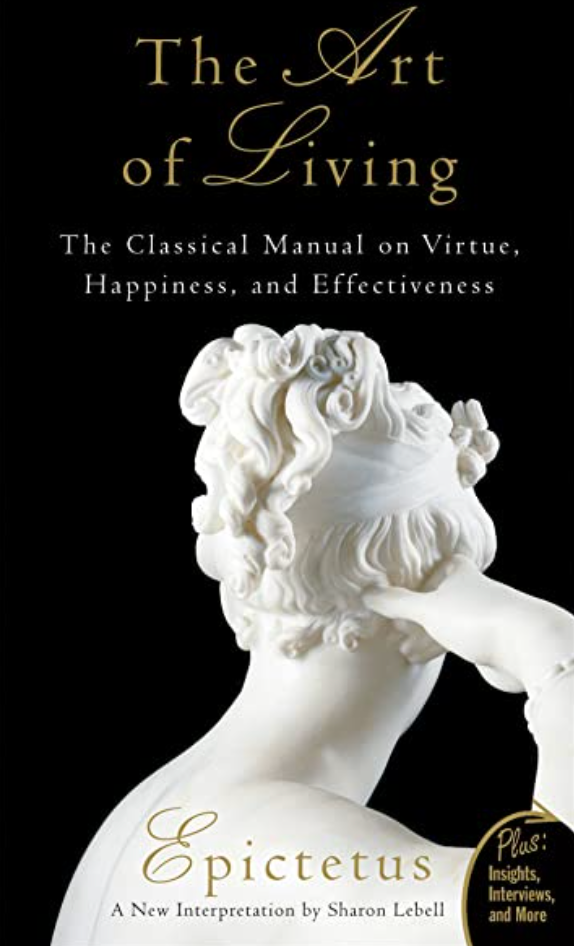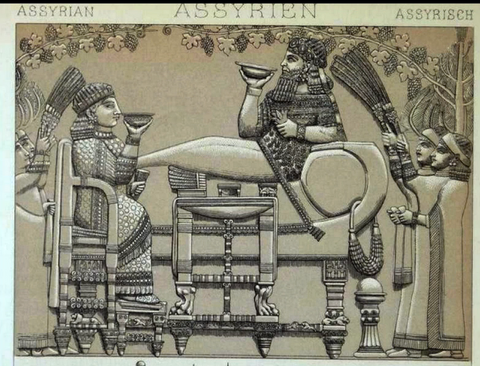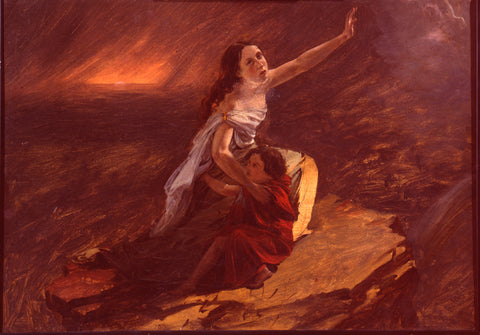The Art of Living: The Classical Manual on Virtue, Happiness and Effectiveness

The Art of Living: The Classical Manual on Virtue, Happiness and Effectiveness
In this book, Sharon Lebell attempts to give a new interpretation to the teachings of Epictetus, a man born into slavery in 55 A.D. in the Roman Empire. Freed from slavery, he established a school of Stoic philosophy. Stoicism at the time was a belief system that virtue is the highest good, and that perfecting moral virtue will free humans from sadness, loneliness, fatigue and more. His school helped human beings can meet the challenges of life successfully by putting his teachings into practice. He describes ideas of virtue being inner peace, a higher life, serenity, freedom from inner turmoil, a higher power, and accepting what is out of one’s control. All these characteristics lead to living a happier life.
Many of the concepts in the book are ones heard often as modern-day advice, and ones that seem intuitive when thinking about how to live a healthy and happy life. For instance, they include: treat your body well; eat healthily; get enough sleep; don’t focus on material and superficial things; don’t concern yourselves with the opinions with others; accept things that are out of your control; think before you act; don’t follow social conventions for no reason. It would be interesting to read a translation of Epictetus’ actual words, as Sharon Lebell’s interpretation at times seems “light”, almost in a fortune cookie kind of way, and yet these concepts were clearly meant to be taken very seriously and arose from significant thought and study. For instance, her attempt to make his teachings “modern” by inserting relatable examples- “have you misplaced your wallet?”- often read as out of place in the book. These attempts to modernize the teachings actually confuse the reader because on the next page the example will be about bathing quickly (which had negative connotations at the time), so mixing metaphors by trying to relate to a modern-day reader makes the ideas paradoxically less clear. The reader is left wondering if she is reading a period piece or a contemporary self-help manual. It would be better to let the teachings speak for themselves, in the context of the time period in which they were written.
At times, Epictetus’s ideas on attaining virtue feel too difficult and serious, almost monk-like or Quaker in their austerity. For example, he writes “It’s much better to die of hunger unhindered by grief and fear than to live affluently beset with worry, dread, suspicion and unchecked desire”. He talks about living simply and freeing oneself from self-absorption and wanting things, often in a way that feels distasteful and not politically correct by today’s standards. For example, when he writes about socio-economic classes: “Consider how much more frugal the poor are than we, how much better they forebear hardship.” He writes prolifically about abstinence from many things: from unhealthy food, material possessions and luxury, and even abstaining from sex until marriage. His focus on moral progress and seeking a “higher life” feels overly religious by contemporary standards, and he often mentions a higher power, or people “returning to” their maker. There certainly isn’t a lot of mention of “fun”. In fact, the only time laughter comes up as a part of being happy is when he writes that if something is funny one may laugh “sparingly.” Happiness is more about serenity than having a good time in this book.
There are other parts of the book that feel “dated” and old fashioned (after all, it was first written in the first century AD!), such as the recurring theme of the death of a child, and one’s ideal response to that tragedy and other death. When reading books written in another time period, it is important to keep the context in mind- this was a time when death was much more common (due to the lack of germ theory and understanding of viruses and contagion) and so issues such as these came up and had to be handled. Additionally, when talking about how to handle difficult or bad people, Epictetus uses robbers and thugs as examples, whereas in todays’ society our homes are not easily “plundered”. We have to adapt these tenets of Epictetus to today’s time to understand what he meant, perhaps replacing “robber” and “thug” with a nasty neighbor, jealous classmate or conniving business associate.
Likewise, when Epictetus talks about choosing one’s goals, he uses the example of wanting to participate in the Olympic Games and elaborates on what it takes to achieve that. Again, the reader must keep in mind that this goal would have resonated with people at that time (versus today, where one would need to start training for the Olympics from childhood in order to have a small chance of competing for one’s country). The lesson he is trying to convey however, that difficult goals take hard work, and perhaps the amount of work that will be required by the chosen goal renders it unlikely or not worth it, is apropos to today. He is giving the Olympic example to demonstrate that one must assess the likelihood of achieving a goal before going for it. For instance, I might want to be a concert soloist, but I cannot sing at all also that would be a frustrating and difficult goal to achieve for me. I would be better off having the goal of being an artist, where I actually have talent and dedicated practice would yield quicker results. This reminded me of several of the concepts we have discussed in class, about identifying one’s strengths, and one’s values and goals, and fining the intersection. If we focus on our values, and then correspond them to what we are actually naturally good at, we will be happier trying to achieve those goals. Thus, when the reader keeps the context in mind and can adapt to a modern society, the teachings often make more sense.
Despite the overly stoic nature of many of the teachings, there are certain tenets that feel absolutely modern and relevant today without any adaptation or re-contextualizing. A few that stood out to me are not letting others determine your self-worth; sticking to your chosen course of action regardless of what others think of your decisions; and especially letting one’s actions speak for themselves. For instance, he writes: “Show your character… through your actions”. Another section that stands out to me is the chapter about rewards requiring hard work. In my opinion, this is something that is often lost sight of in today’s culture where everyone wants to get as much as possible for minimal effort. Epictetus drives the point home several times that people achieve things through hard work, you should applaud other people’s successes, and that what they have does not take away from what you can achieve. He says to “delight in that person enjoying” the advantages they have secured. He writes “It is unreasonable to think we can earn rewards without being willing to pay their true price”. Another prescient teaching which he espoused was not to allow other people influence your mind, something quite relevant in today’s culture of fake news and Facebook advertising scandals. He compares this to someone giving away one’s body (which one would never allow) yet he says we often allow people to take over our minds, i.e. be influenced by what they think of us or influence what we think of others. He talks about not allowing anyone else into your mind, and in another chapter about speaking sparingly.
This concept, together with his teachings on correct use of speech, choosing one’s words, describing things as they are (he using the example of saying that someone drinks a lot rather than that they are a drunk) and not making assumptions, encompasses the strongest and more relevant takeaways from the book for today. When taken with a “grain of salt”, the book offers both an interesting insight into a new school of philosophical thought at the time, as well as offering insights into ways of living that can lead to a happier and more meaningful life today.








